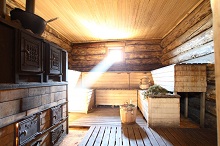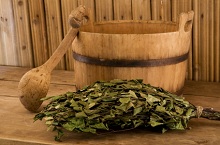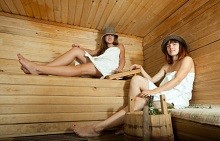| FR | About us | Home | User agreement | Link to us |
Russian Banya

Banya (a Russian type of sauna, a kind of steam bath) is one of the oldest Russian traditions. Despite the fact that this tradition is several centuries old, the banya is popular even today. You can find banyas in large cities and small towns. Usually those Russians who have summer cottages, almost always build their own banya there.
How a Russian banya is set up
A Russian banya (ба́ня) has a special room, where a large amount of hot steam is created with the help of water and hot air. A classic Russian banya is heated with firewood, but modern versions might use electric heat as well. Inside the banya, which is usually built of wood, there are wide wooden benches along the walls. They are built up one above the other like steps. You can sit or lay on the benches. The higher up the bench the hotter the air is. Once someone has warmed up well enough, he or she leaves the steam room (it is called the парна́я in Russian) and dips into a pool of cold water. You can also pour water over yourself from a tub (уша́т), while in Siberia it's common to walk right out of the steam room and jump into the snow.
What do you need a venik in the banya for?

At Russian banya there are special bath brooms (ве́ник) that are used. These brooms or veniks are bundles of twigs and leafy branches bound together from some kind of tree—usually they are from birch or oak trees. The veniks are dipped into cold water and then smacked briskly all over the body. There is a special person who is responsible for this, called banschik (ба́нщик). But usually people don't need banschik's help because groups of friends typically go together and are able to smack each other with veniks.
Banya is a place for communication

Friends go to the banya with a special purpose in mind. It’s considered that the banya atmosphere brings people closer together, allows them to communicate and interact on a more common level. Russians don't spend all their time in the parnaya (парна́я is a room with hot wet steam). During a break they walk out to another room which is called predbannik (предба́нник is a room before the steam room). Usually, that room has a large long table and a few benches. In the predbannik, people take a break from the hot temperature and relax, drink aroma tea or special herbal tea, have conversations about life and share their ideas or beliefs to each other.
Russian proverbs about the banya
Russians have lots of proverbs and sayings about banya. Here are a few of them in Russian and English:
Ба́ня здоровит, разгово́р весели́т.
The banya makes you healthy, it stimulates conversation.
Ба́ня - мать втора́я.
The banya is like a second mother.
В ба́не помы́лся — за́ново роди́лся.
Washing up in the banya is like being born again.
Вы́лечился Ва́ня — помогла́ ему́ ба́ня.
Vanya has recovered from sicknesses - thanks to the banya.
Приста́л, как ба́нный лист!
Stuck like a limpet! (literally: Stuck like a banya's leaf.)
В ба́не ве́ник доро́же де́нег.
A bath-broom in the banya is worth more than money.
Benefits of Russian banya
The benefits of the banya have been known for a long time. Hot steam (пар) helps clean the skin, makes it soft and smooth. The Russian banya helps fight sicknesses — harmful elements are removed from the body thanks to the bath-brooms (ве́ники) and hot steam. Overweight women who want to lose weight are recommended to go to the banya once a week. And there is a reason for another Russian proverb which refers to the banya's health benefit, "The day you spend in the banya is the day you do not age." (В кото́рый день па́ришься, тот день не ста́ришься.)
Russian Banya Vocabulary
ба́ня - banya (Russian sauna and steam bath)
парна́я - a steam room
ве́ник - a bath-broom (bunches of dried or fresh branches and leaves)
уша́т - tub
предба́нник - the entrance room
ба́нщик - a banya's service person
пар - steam
вода́ - water
здоро́вье - health
Got questions?
Ask them in the Russian Questions and Answers — a place for students, teachers and native Russian speakers to discuss Russian grammar, vocabulary, pronunciation, and other aspects of the Russian language.
Copyright 2001-2026 MasterRussian.com | Privacy Policy | Contact Us
 Russian Lessons
Russian Lessons
- Russian alphabet
- Names of letters
- Russian Q&A new
- Pronunciation: Cons.
- Pronunciation: Vowels
- Noun Gender/Number
- Cases of Nouns
- Russian Greetings
- Personal Pronouns
- Learning Russian
- 1000 Common Words
- 500 Russian Verbs
- Top Russian Nouns
- » All lessons
- » Guest lessons
 Browse Topics
Browse Topics
- Start learning Russian
- Forum
- Bookstore
- Dictionaries
- Russian - basic
- Russian - adv
- Pronunciation
- Russian Blog new
- Reading
- Test & quizzes
- Translation
- Verbs
- Verb Conjugations
- Russian numbers
- Russian Tests new
- Vocabulary
- Writing
- Folk music
- Fun stuff
- Leo Tolstoy
- Learner's lore
- Literature
- Personal blogs
- Picture Dictionary new
- Proverbs
- Publications
- Radio & TV
- Russian culture
- Schools in Russia
- Russian Words
- Russian names
- Software
- Russian Words iPhone

Search MasterRussian

English » Russian dictionary

WORD OF THE DAY
![]() RSS
|
iGoogle
|
My Yahoo!
RSS
|
iGoogle
|
My Yahoo!
Meaning: face, front, countenance
Pronunciation: [lee-TSOH]
Learn Russian words more... »
TODAY'S STREET SIGN

Russian: Аптека
English: Drug store
FOLLOW US ON TWITTER

MasterRussian on Twitter


